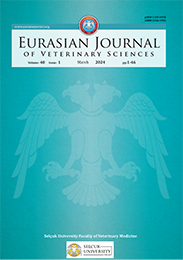| 2023, Volume 39, Number 2, Page(s) 077-083 | |
| [ Summary ] [ PDF ] [ Similar Articles ] [ Mail to Author ] [ Mail to Editor ] | |
| Sero-epidemiology of the Rhodococcus equi in horses in Eastern Kazakhstan | |
| Kassymov Yerken1, Ali Uslu2, Otarbayev Bauyrzhan12, Zafer Sayin2, Aslı Balevi2, Ismagulov Yerbol3, Ilgekbayeva Gulnaz D1, Aysegul Ilban2, Osman Erganis2 | |
| 1Kazakh National Agrarian Research University, Veterinary Science, Department of Biological Safety, Almaty, Republic of Kazakhstan Selcuk University, Faculty of Veterinary Medicine, Department of Microbiology, Konya, Türkiye 3Veterinary Control and Supervision of the Ministry of Agriculture, Nur-Sultan, Republic of Kazakhstan |
|
| Keywords: Kazakhstan, Rhodococcus equi, seroprevalence | |
| Abstract | |
Aim: This study was designed to evaluate Rhodococcus equi (R. equi)
seroprevalence in adult horses in East Kazakhstan. Materials and Methods: Sera were collected from 311 horses in 3 regions (Zhambyl, Almaty, East Kazakhstan) across the eastern regions of Kazakhstan between September and November 2021 and the presence of antibodies against virulent R. equi was detected by enzyme-linked immunosorbent assay (ELISA). Results: The equine seroprevalence of R. equi was found to be 93.6% in 2021. The highest seroprevalence VapA rate was in the Zhambly Region (98.02 %) and the lowest in the East Kazakhstan Region (88.89%). Samples taken from this region constitute 69.8% of the total samples, and 3.84% are vapA seronegative. R. equi appears to be endemic in East Kazakhstan. Conclusion: This is the first seroprevalence study of R. equi in Kazakhstan that provides information on epidemiology. Serological findings should be supported by clinical cases and the isolation of bacteria from foal barns. Based on the findings, protection and control programs against R. equi should be implemented in eastern Kazakhstan. |
|
| [ Top ] [ Summary ] [ PDF ] [ Similar Articles ] [ Mail to Author ] [ Mail to Editor ] | |




